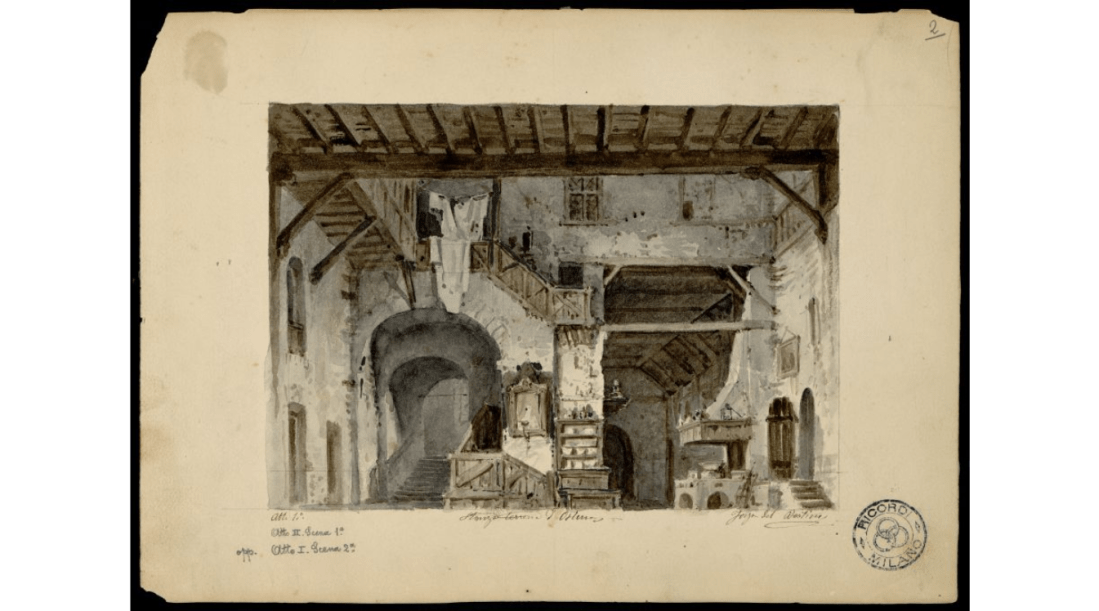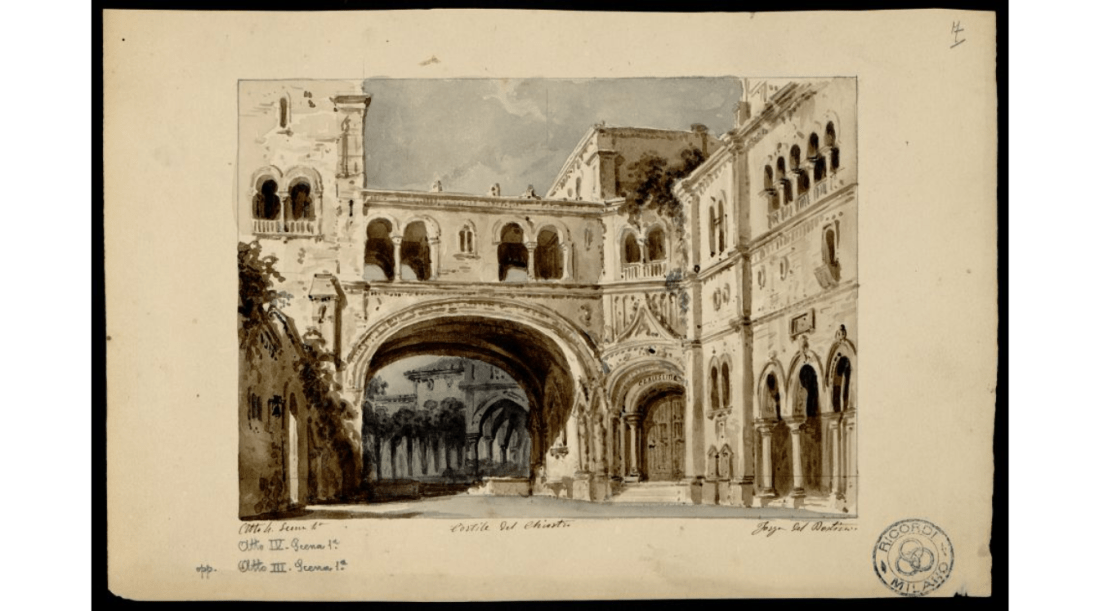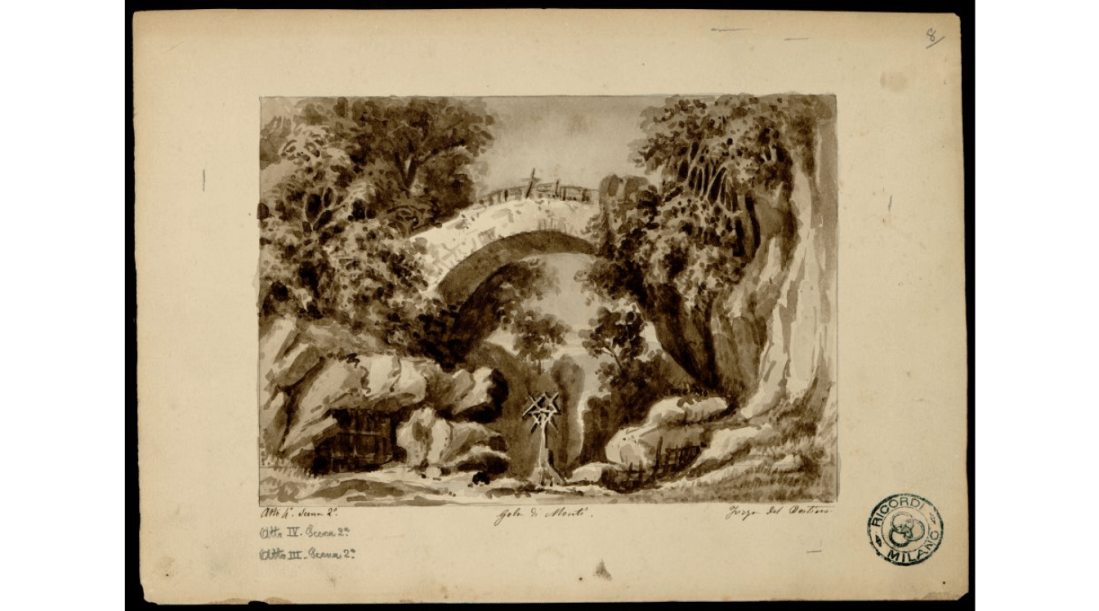- Opera in 4 acts
- By Giuseppe Verdi
- Librettist: Francesco Maria Piave, after Ángel de Saavedra’s Don Álvaro o la fuerza del sino (1835)
- First performed: Bolshoi Kamenny Theatre, St. Petersburg, Russia, 10 November 1862.
- Revised version: La Scala, Milan, 27 February 1869.
| IL MARCHESE DI CALATRAVA | Bass | Signor Meo |
| DONNA LEONORA, his daughter | Soprano | Carlona Brabot |
| DON CARLO DI VARGAS, his son | Baritone | Francesco Graziani |
| DON ALVARO | Tenor | Enrico Tamberlick |
| PREZIOSILLA, gypsy girl | Mezzo | Constance Nantier-Didiée |
| PADRE GUARDIANO, Franciscan monk | Bass | Gian Francesco Angelini |
| FRA MELITONE, Franciscan monk | Baritone | Achille De Bassini |
| CURRA, Leonora’s maid | Soprano | Signora Lagramanti |
| An Alcade | Bass | Ignazio Marini |
| MAESTRO TRABUCO, muleteer and then huckster | Tenor | Geremia Bettini |
| A Spanish military surgeon | Bass | Alessandro Polonini |
| Muleteers; Spanish and Italian peasants, soldiers, and camp followers; Italian recruits; Franciscan monks; Beggars | Chorus |
SETTING: Spain and Italy, towards the end of the 18th century

La forza del destino is a vast, even unwieldy, opera – and one of Verdi’s most difficult works. He mixes scenes, moods and operatic styles in an opera that takes place over nearly a decade, and, its critics say, violates every notion of dramatic unity and common sense.
Don Alvaro (tenor) – an Incan prince in disguise – accidentally kills his girlfriend Leonora’s (soprano) father, the Marquis of Calatrava. He throws down his gun, which promptly goes off and shoots the old man, who hangs onto life just long enough to curse his daughter. Don Carlo di Vargas, her brother (baritone), vows to find both her and her lover, and kill her. Leonora puts on a monk’s robe and becomes a hermit living in a cave. We don’t see her again until the end.
Don Carlo enlists in the Spanish army, and swears an oath of friendship with another officer – who turns out to be Don Alvaro! The two fight a duel. Don Alvaro becomes a monk, but Don Carlo pursues him to the monastery, and goads him into another duel by calling him racist names. Don Alvaro fatally wounds him – outside a hermit’s cell. The hermit appears – it’s Leonora! Don Carlo kills her, and then dies. (In the opera’s original version, composed for St Petersburg, Don Alvaro then hurled himself off a cliff.)

And the opera is full of gypsy girls, beggars, pedlars, and monks. And the soprano doesn’t appear for half the opera!
“It is hard to decide,” Michael Forman (The Good Opera Guide, 1994) writes, “whether Verdi was just out of practice, wasn’t really trying, or had temporarily lost his marbles.”
If one views the play from a Classical perspective, as many critics seem to do, the work necessarily seems a mess. But it’s not Classical; it’s a Romantic opera, written under the influence of Victor Hugo.
Don Álvaro o la fuerza del sino, the play on which Verdi based his opera, was written by the Duke of Rivas, a liberal man of letters and devotee of Hugo. The opera, as one early review recognized, puts the principles of Hugo’s Preface to Cromwell, effectively the Romantic manifesto, into practice: mixing high-born and low-born characters, comedy and tragedy, the ugly and the beautiful, to show the world in all its complexity.
The opera doesn’t violate the Aristotelian unities of time and place so much as ignore them; it’s not interested in them. Instead, the opera’s aesthetics are based on kaleidoscopic variety.
Scene follows scene in dizzying array: aristocratic mansions; taverns in Spanish villages; monasteries; battlefields and military encampments during the War of Austrian Succession. Smaller roles proliferate: Preziosilla the gypsy girl (a cousin to Carmen) singing French opéra comique-style arias; and the grumpy monk Fra Melitone, a Rossinian buffo bass.
Other sections of the score nod to opera and symphonic music. The overture has often been called Beethovenian, the monks’ curse and prayer is French grand opéra (modelled on Meyerbeer’s Blessing of the Swords in Les Huguenots), and Leonora’s arias are Bellinian in their long lines.
Listening to it, though, on CD can be dispiriting, because it’s less tuneful than Verdi’s other mature operas. Much of the opera is in functional arioso (heightened recitative), but there are a couple of great arias and some impressive set-pieces.
Verdi uses the chorus as a protagonist in its own right, as Meyerbeer did in his grand operas (notably in Les Huguenots and Le prophète) and Mussorgsky did in Boris Godunov (clearly influenced by both Meyerbeer and Forza). In Verdi’s earlier operas, the chorus was often a faceless group; block-like assemblies of types (bandits, soldiers, sailors), who sing en masse, and mainly exist to provide musical backing to the lead singers. Here the chorus are crowds of individuals: guests at a Spanish tavern, watching dances, and praying as pilgrims pass by; soldiers in a military encampment, gambling and drinking; war victims asking for food from a monastery. They are humanity celebrating and suffering.
All of this was necessary for Verdi to write what he called “an opera of ideas”. Like Meyerbeer and Wagner, he used the broader dimensions of grand opera for a philosophical work.
Forza is an opera about the role chance (or fate) plays in our lives, despite our good intentions – and how we deal with this.
We can never fully control our lives, Verdi suggests, because they are changed by outside forces. The chance firing of a pistol, thrown down by a man trying to avert bloodshed, ruins the lives of the Calatrava clan, sending them into a years-long spiral of pursuit, hatred, revenge and fratricide. On a larger scale, we are caught up in the events of history. Larger events and social forces – politics, war, poverty, starvation – affect the masses. We may not be able to control our lives, but, as the Padre Guardiano tells the monk Melitone, we can have compassion for those who suffer.
The St Petersburg version is nihilistic. It ends with a stage littered with corpses, and Don Alvaro’s howl of despair against the universe as he leaps to his death: “I am a messenger from hell! Let the earth open! May hell swallow me! May the heavens fall! And may mankind perish!”
Verdi was unhappy with the original ending, and changed it after meeting the writer Alessandro Manzoni, whom he considered a saint.
The second version ends on a note of Christian resignation, with Alvaro and the Padre Guardiano (Father Superior) kneeling by Leonora’s corpse. Leonora may have died, but, she promises Alvaro, they will meet again in heaven. Mankind, the opera suggests, cannot understand the ineffable; God (or, for the agnostic Verdi, the universe) moves in ways we cannot fathom, but there is a purpose to every action, even if we cannot grasp it.
The premiere in St Petersburg was only a muted success, and Verdi, unhappy with the work, revised it for Italy. It did well enough for much of the later nineteenth century, but hit low ebb in the early twentieth century, when Wagnerian aesthetics dominated. Since then, it’s become regularly performed.
It’s supposed to be cursed, though. Pavarotti refused to perform in it, and clutched his testicles whenever it was mentioned, in case the scenery collapsed on him or (as happened to one baritone) he dropped dead onstage.
STORY
Synopsis based on translation, Fred Rullman, New York
ACT ONE
The mansion of Leonora’s family, in Seville.

Don Alvaro, a youth from India, of noble ancestors, but not much thought of at Seville, becomes enamoured with Donna Leonora, the daughter of the Marquis of Calatrava, who. notwithstanding his love for his child, is strongly opposed to countenance any alliance other than of the highest origin. Leonora, who in her turn burns with the fire of a lover’s heart, and knowing her father’s aversion, determines to make her escape with Alvaro, aided by Curra, her confidant. Yet destiny seemed to will it otherwise, for just as they are on the point of departing she feels a desire to see her doting father once again, and in the delays he enters, putting a check to the then reigning happiness, and vents his ire together with threats of death on Alvaro, who, to justify his intrusion, and to quiet any suspicion that might arise respecting the purity of Leonora, bids the Marquis to take him captive, or to wreak his vengeance; at the same time throwing away his pistol which goes off and mortally wounds the Marquis. Leonora, horror-stricken, rushes to her father’s feet, who curses her with his dying breath.
ACT TWO
Scene 1: An inn in the village of Hornachuelos

The second act commences with a scene in the kitchen of an inn in the village of Hornacuelos, where are assembled the Alcade, several peasant muleteers, and Don Carlo of Vargas, brother of Donna Leonora, who, having heard of the cruel death of his father, is in search of the culprit to avenge the blood of the Vargas, and thus appears as a student of Salamanca under the fictitious name of Pereda. In the meantime Leonora, in male attire, arrives, accompanied by Trabucco, a muleteer, who refuses to give any satisfaction respecting the traveler incognito. During the supper Preziosilla, a young gipsy, entertains them by telling the young men their fortunes, whom she exhorts to go to the war in behalf of Italy’s freedom, which all agree to do. Don Carlo tells them of his father’s cruel fate, which Leonora hears from within with fear and trembling, and arouses all her energies to escape him.
Scene 2: A monastery nearby

Leonora, after this narrow escape of being caught by Don Carlos, seeks refuge in a monastery.
where she reveals to the abbot that she was Leonora of Calatrava, who had come to him to repent, and lead the remainder of her days in a hermitage. The abbot tells her of the many trials she must undergo, and after calling his friars about him, warns them not to approach the cave under the penalty of being cursed. Leonora departs for her solitary abode, after having received the abbot’s blessing.
ACT THREE
Scene 1: A forest near Velletri, in Italy

Don Alvaro, after the fatal night, serves in the Spanish army under the assumed name of Don Federico Herreros. One night, while walking pensively, he hears cries for help and rushes out to render his assistance. Now the man’s life that he then saved was none other than that of Don Carlo, who was also serving in the same army under the name of Don Felix Bornos. This incident causes a sworn friendship to be established between them, and they go into battle fighting side by side.
Scene 2: The officers’ quarters

During the contest Don Alvaro is, as they suppose, mortally wounded, whereupon he confides to Carlo’s care a valise, directing him to burn a bundle of letters in it as soon as the breath should leave his body, but causing him to swear that he would not look at their contents. When Carlo is left to himself, he begins to be suspicious of the character of his friend, thinking that he might perchance be the seducer of his sister, and that the letters might reveal the fact; but honor alone deters him from examining the bundle, so having taken no oath in reference to the other contents of the bag, he examines it, and, to his great astonishment, finds the likeness of Leonora, when all is revealed. At that moment the surgeon enters, and prophesies the recovery of Alvaro. Carlo is exultant in joy over the hope that he may still avenge his father’s blood.
Scene 3: A camp near the battleground

The scene changes to an encampment near Velletri (Italy), where Italian and Spanish soldiers are gathered with Preziosilla. Shouts for the union of Spain and Italy are raised. Trabucco makes his appearance as a peddler, and sells and buys articles. Drafted recruits come weeping for having been forced from their homes, but Preziosilla and the vivandiers try to cheer them up. All rejoice and dance. Fra Melitone, who came from Spain to console the wounded, is forced into the dance. He scolds them, and escapes from the Italian soldiers who wish him harm. Preziosilla, seeing his danger, beats the drum, and calls the soldiers around her. Don Alvaro, recovered, enters, accompanied by Don Carlo, who tells him his true name, and reproaches him with the murder of his father. Don Alvaro denies, but he is compelled to fight with Don Carlo. After the duel Don Alvaro swears that he will pass the remainder of his days in a cloister, thinking that he had killed Don Carlo.
ACT FOUR
Scene 1: The monastery

The scene is in the suburbs of Hornacuelos, where Melitone is seen distributing
soup to the poor, and rebuking them for their want of gratitude. After this Melitone reveals his suspicions to the abbot respecting Father Raphael, who is in reality Don Alvaro, when Don Carlo arrives at the cloister, entirely recovered from the wounds of the duel in search of Alvaro, to again force him to a combat ; but Alvaro refuses, till he is too much insulted, and no longer able to restrain his boiling blood.
Scene 2: A desolate spot near Leonora’s hermitage

So both go forth, amid thunder and lightning, to fight, and the ground they select is that cursed spot just before Leonora’s cave. Don Carlo falls and as he feels that his last. moments are approaching, desires to confess before he dies. But Alvaro, being cursed, is unable to bless him, and goes to the cave to call the monk. Leonora, being greatly alarmed, rings the bell, which is the signal for help, but before the friars come to her assistance, she recognizes the voice of Alvaro, rushes forth, and seeing her brother all bleeding, throws her arms around him, and he stabs her to the heart.
ORIGINAL VERSION: Don Alvaro, having lost the object of his affection, precipitates himself from the rocks, as the monks arrive, singing the miserere.
REVISION: The Padre Guardiano receives Leonora’s dying breath, and comforts Don Alvaro.
RECORDINGS

Watch: The 1984 Met performance, starring Leontyne Price (Leonora), Leo Nucci (Don Carlo) and Giuseppe Giacomini (Don Alvaro), conducted by James Levine.
Listen to: The 1955 Decca recording, starring Renata Tebaldi (Leonora), Mario Del Monaco (Don Alvaro), and Ettore Bastianini (Don Carlo), conducted by Francesco Molinari-Pradelli.
STRUCTURE
- 1. Sinfonia
ACT ONE
The mansion of Leonora’s family, in Seville.
- 2. Introduzione – Scena: Buona notte, mia figlia
- 3. Recitativo e Romanza: Me pellegrina ed orfana (Leonora)
- 4. Scena e Duetto: Ah per sempre, o mio bell’ angelo (Leonora, Don Alvaro)
- 5. Scena – Finale I: Vil seduttor! … infame figlia!
ACT TWO
Scene 1: An inn in the village of Hornachuelos
- 6. Coro ballabile (Seguidilla): Holà, holà, holà !
- 7. Scena : La cena è pronta
- 8. Recitativo e Canzone : Al suon del tamburo (Preziosilla)
- 9. Preghiera : Padre Eterno Signor
- 10. Scena : Viva la buon compagnia !
- 11. Ballata : Son Pereda, son ricco d’onore (Don Carlo)
- 12. Scena, Coro e ripresa della Danza
Scene 2: A monastery nearby
- 13. Aria: Madre, pietosa Vergine (Leonora)
- 14. Scena: Chi siete?
- 15. Scena e Duetto: Più tranquilla t’alma sento (Leonora, Padre Guardiano)
- 16. Finale II: Il santo nome di Dio Signore
ACT THREE
Scene 1: A forest near Velletri, in Italy
- 17. Scena e Romanza: Oh tu che in segno agli angeli (Don Alvaro)
- 18. Scena e Duettino: Amici in rita e in morte (Don Alvaro, Don Carlo)
- 19. Scena e Battaglia: All’armi! all’armi!
Scene 2: The officers’ quarters
- 20. Scena e Duettino: Solenne in quest’ora giurarmi dovete (Don Alvaro, Don Carlo)
- 21. Scena ed Aria: Orna fatale del mio destino (Don Carlo)
Scene 3: A camp near the battleground
- 22. Ronda: Compagni sostiamo
- 23. Scena e Duetto: Sleale il segreto fu dunque violato
- 24. Coro e Strofe: Venite all’indovina
- 25. Scena ed Arietta: A buon marcato chi vuol comprare
- 26. Coro: Pane pan per carità
- 27. Coro tarantella: Nella guerra e la follia
- 28. Scena ed Aria Buffa: Toh, toh! … Poffare il mondo!
- 29. Rataplan: Rataplan, rataplan della gloria
ACT FOUR
Scene 1: The monastery
- 30. Coro ed Aria Buffa: Che? siete all’osteria? (Fra Melitone)
- 31. Scena e Duetto: Del mondo i disinganni (Padre Guardiano, Fra Melitone)
- 32. Scena: Giunge qualcun … aprite
- 33. Scena e Duetto: Col sangue sol cancellarsi (Don Alvaro, Don Carlo)
Scene 2: A desolate spot near Leonora’s hermitage
- 34. Melodia: Pace, pace, mio Dio (Leonora)
- 35. Scena e Terzetto Finale: Non imprecare, umiliati
3 thoughts on “22. La forza del destino (Giuseppe Verdi)”